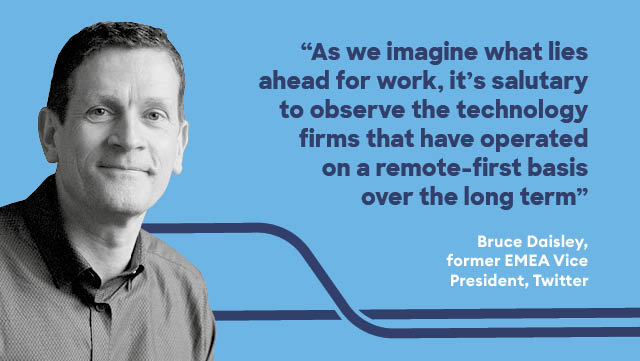If we can banish ‘Taylorism’ and balance remote and office working, trust, autonomy and responsibility may flourish.
Over recent months, perhaps for the first time in our working lives, each of us has been forced to confront our own workplace instincts, habits, and prejudices.
On reflection, it’s hard, as we develop through our working lives, to separate the working conditions our colleagues and team members need to succeed, from the conditions that enable us to see that they are grafting, and contributing to the success of the organisation.
Inherent slackers
For many years, management theory was styled according to Taylorism. Named after American mechanical engineer Frederick Winslow Taylor, this approach champions efficiency, addressing the challenge of individuals not working as hard as they are capable of working. It measures an employee’s potential output and benchmarks their daily performance against it. The underpinning notion is one of supervision – workers are inherently slackers who need to be monitored.
There has been more than a degree of Taylorism in the way we have tended to use the office, arranging our teams around us and supervising them to ensure they at least look busy; the assumption being that it is natural human behaviour to take advantage of opportunities to skive.
The high watermark of Taylorism is the attitude of businessman and star of TV show The Apprentice, Alan Sugar, patron saint of frank boardroom judgement. In June, in the midst of the UK lockdown, he tweeted:
“To be honest, before COVID, we never had people working from home unless they were sick or snowed in. Call me old fashioned but I don’t agree with it. I think people need to get out of bed in the morning and go to a place of work and turn up on time.”
Interestingly, as the remote-working experiment went on, Lord Sugar’s perspective started to look less and less in step with reality. Research from PwC suggested that worries relating to productivity dipped significantly during lockdown; concerns around economic depression dominated leaders’ thoughts, rather than anxiety over whether or not their teams were toiling unsupervised.
A balanced approach
Of course, even with remote working, Taylorism persists. If you’re one of the many workers taking part in hours of video calls every week, you might well feel that levels of supervision remain unchanged.
However, as we imagine what lies ahead for work, it’s salutary to observe the technology firms that have operated on a remote-first basis over the long term. For example, one of these pioneers, Basecamp (which develops project-management and internal communication tools) asserts that video meetings “should be a last resort”.
Looking at firms such as these gives us more clues to how we could create an effective balance between remote and office working. Having greater intentionality seems to be the key: what could be done better in an office environment and what is best done remotely? Being together in the office seems to be more effective for team cohesion, for creative collaboration and for celebrating. Working remotely may be more appropriate for focused work, for reflection and for getting things done.
Building a new world of work powered by trust, autonomy, and responsibility is the prize on offer now, and our challenge is to banish our instinctive Taylorism and let it flourish.
Bruce Daisley is the former EMEA vice president of Twitter and current author of weekly newsletter The Joy of Work, covering work and organisational culture. Subscribe at EatSleepWorkRepeat.com
This article is from ‘Adapting is thriving’ – our exclusive e-book produced in partnership with Michael Page. To download the full e-book, which features insights from leading thinkers in the employment space on the post-pandemic workplace, click here.
Register for insights and updates or implement one of our levy-funded leadership programmes by clicking on the button below.

















